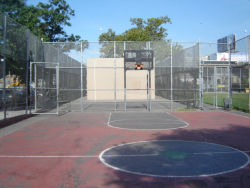Gonzalo Plasencia Playground
Gonzalo Plascencia Playground
What was here before?
This site was once part of the Delaplaine family estate. Originally spelled de la Plaine, the family patriarch was Nicholas de la Plaine, a French Huguenot who fled to New Amsterdam in 1657. His descendants became influential in New York, notably Samuel Delaplaine (1750-1809), a Quaker abolitionist; John Ferris Delaplaine (1786-1854), a successful shipping merchant; and Isaac Clason Delaplaine (1817-1866), a lawyer and U.S. Congressman. Several Delaplaine descendants, including Isaac, are interred at Green-Wood Cemetery. Their graves, marked by an imposing family crypt, remain notable fixtures in the cemetery.
How did this site become a park?
The City purchased the land in 1958 to provide a playground for the adjoining I.S. 136, the Charles O. Dewey School. Originally opened in October 1965 as the J.H.S. 136 Playground, this site was known as Third Ave Playground (1986), then Playground Three Forty (1997) before its named Gonzalo Plasencia Playground (2005). It is jointly maintained by NYC Parks and the Department of Education.
In the late 1990s the upper playground was redesigned and reopened in 1998 with three new play structures, safety surfacing, new trees, and a spray fountain surrounded by fanciful frog statues. The lower playground contains a large grassy baseball field, as well as fenced basketball and handball courts.
What is this park named for?
Gonzalo Plascencia (1909-2003) was a respected writer and community advocate.
Born in Puerto Rico in 1909, Plascencia immigrated to New York City in 1929 and settled in Sunset Park, Brooklyn, where he became a key figure in the Puerto Rican community. He was known locally as a "man of letters" and wrote regularly for the Sunset News as a columnist, using his platform to highlight the concerns, culture, and contributions of Puerto Ricans living in Brooklyn.
He worked at the Tootsie Roll factory located in SoHo, and highlighted the struggles of Puerto Rican workers, including employment discrimination and tensions with the New York Police Department. His reflections on these issues offered a firsthand perspective on the immigrant labor experience in mid-20th-century New York.
Plascencia founded a Puerto Rican baseball league, helped establish the Puerto Rican Pioneers Parade and collaborated with advocacy groups like UPROSE in Sunset Park to address local concerns and uplift Latino voices.
In 1974, he participated in a recorded oral history interview in Spanish with Jaime Barreto, part of the Puerto Rican Oral History Project organized by the Brooklyn Historical Society.
Check out your park's Vital Signs
Clean & Safe
Green & Resilient
Empowered & Engaged Users
Share your feedback or learn more about how this park is part of a
Vital Park System


